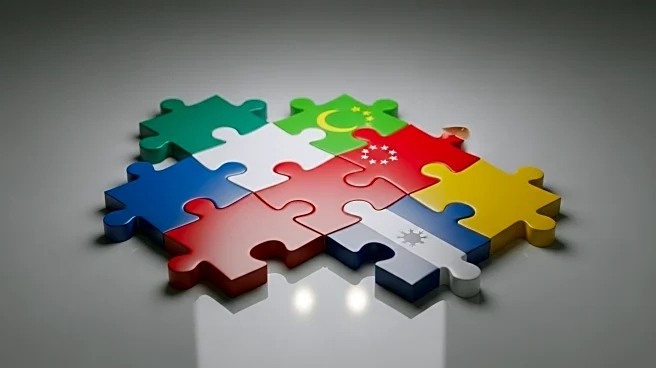What's Happening?
Chatham House, led by Ben Bland, is examining the evolving dynamics of global leadership as U.S. allies in Europe and the Indo-Pacific consider new cooperative strategies. With President Trump back in the White House, there is growing concern among U.S. allies about the stability of the international order. Despite these concerns, countries such as the U.K., France, Germany, Australia, New Zealand, Japan, and South Korea are increasingly willing to coordinate on shared interests like trade, defense, and alliance management. Recently, foreign ministers from these nations met during the U.N. General Assembly in New York to discuss closer cooperation on issues including maritime security, cybersecurity, and climate change.
Why It's Important?
The willingness of U.S. allies to explore independent strategies highlights a significant shift in global power dynamics. As these countries seek to shield themselves from economic pressures from China and the U.S., their cooperation could lead to stronger regional alliances and economic resilience. This development is crucial for maintaining the free flow of goods, services, and investments, especially as protectionist policies rise. The potential for these nations to collaborate on technology and defense could reduce reliance on U.S. leadership, fostering a more balanced global power structure.
What's Next?
The next steps for these allies may involve deeper integration into existing trade agreements like the Comprehensive and Progressive Agreement for Trans-Pacific Partnership (CPTPP). Additionally, there is potential for increased collaboration in technology and defense sectors, such as the development of next-generation aircraft through the Global Combat Air Program. However, overcoming historical tensions and political differences will be essential for these countries to effectively coordinate and lead without U.S. dominance.
Beyond the Headlines
This shift towards independent strategies among U.S. allies could lead to long-term changes in global governance and economic policies. The ethical and cultural dimensions of this cooperation may influence international norms and standards, particularly in technology and defense. As these nations navigate their relationships with both the U.S. and China, the balance of power in international affairs could see significant realignment.








